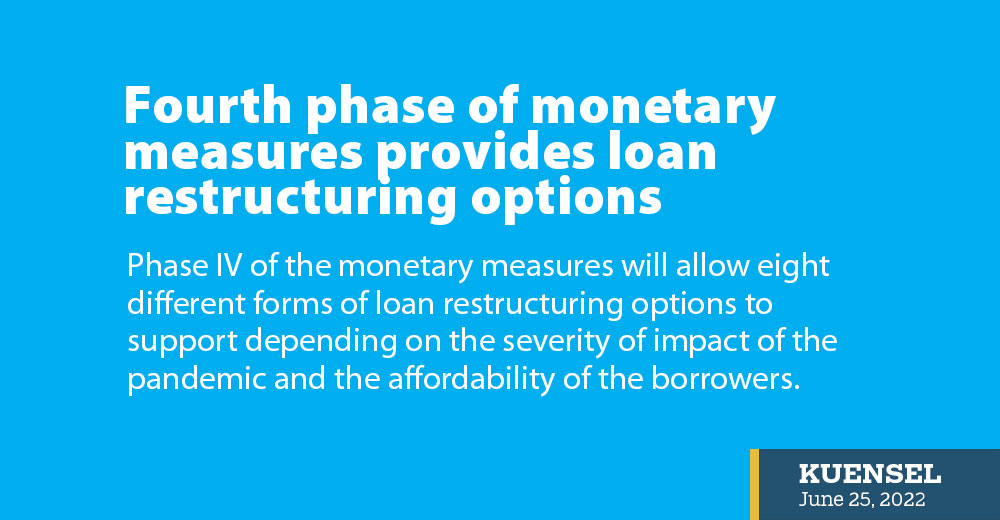Eight loan restructuring measures extended to ease the impact of the pandemic
Thukten Zangpo
Phase IV of the monetary measures will allow eight different forms of loan restructuring options to support depending on the severity of impact of the pandemic and the affordability of the borrowers.
The measures include deferment of loan repayment, partial repayment of loans, extension of maturity period for term loans, change in the repayment frequency, conversion of overdraft or working capital facility to a term loan, loan splitting, transfer of loans to third party, and extension of gestation period.
The Royal Monetary Authority (RMA) issued standard operating procedures (SOP) of the monetary measures to the financial service providers (FSPs) on Thursday which allows them one or more loan restructuring measures based on the risk classification and affordability of the borrowers.
The sectors were categorised under high, moderate, and low risk.
Hotels and Restaurants, both standard and budget are categorised under the high-risk sector, would get a deferment of loan repayment for up to two years and an option of partial loan repayment of 50 percent installment for up to two years.
Similarly, loan-term for hotels and restaurants under construction would be extended from 20 years to 30 years excluding the gestation period for both existing and new loans.
Under the moderate risk sectors, construction (contract-based), hospitality, entertainment, and recreational services, mining and quarrying, manufacturing enterprises, handicrafts and textile production, trade (retail), housing (commercial), home loans, personal loans (consumer and mortgage), transport (commercial and non-commercial), and education loan would get a loan deferment for up to one year. These sectors would also have the option of partial repayment of 50 percent of installments for up to one year.
Both high and moderate risk sectors can extend the maturity period of loan terms up to three years in addition to the deferment period. This will allow a reduction in installment amount by spreading the repayments.
The support measures also allow the sectors to change their repayment frequency to monthly, quarterly, or half-yearly.
The sectors are also eligible to convert the overdraft working capital facility to term loans, which will enable the borrowers to make the payment as per the agreed repayment schedule.
Additionally, loans can be split into multiple accounts to reduce equated monthly installments and can be used with other loan restructuring facilities such as deferment of repayment or partial repayments.
The loans can also be transferred to a third party to an independent party wishing to purchase the collateral.
For projects under construction, the gestation period can be extended up to two years depending on the progress of the project.
Meanwhile, low-risk sectors like institutional or educational services, ICT, contract (non-construction), consultancy services, health services and traditional medicines, wood-based products, renewable energy, hydropower, traditional and herbal medicines, trade (wholesale), crop cultivation, livestock farming, agro-processing, forestry, loan against fixed deposits and others are eligible for an extension of gestation period up to two years depending on the progress of the project.
Interest accrued from loans deferred or partially repaid for the period from phase I to phase IV would be converted to a fixed equated installment facility (FEIF) account.
FEIF accounts are created for the transfer of accumulated interest during the deferment period. Borrowers would be liable to pay the amount in the FEIF account in equal installments for a period of up to five years.
Similarly, for soft working loans ending deferment or gestation period on June 30 this year, the FEIF would be opened for the transfer of accumulated interest and commencement of repayment without charging interest.
However, the RMA stated that a separate directive would be issued on the accounting treatment and other prudential requirements related to FEIF accounts.
According to the RMA, outstanding loans as of June with performing repayments are eligible for the support.
However, loans to the government, loans to financial institutions, staff incentive loans and credit cards, soft working or working capital or bridging loans granted under the previous monetary measures, FEIF accounts, and non-performing loans (NPLs), including loans suspended, under litigation or asset pending foreclosure are not eligible for the latest monetary measures.
The SOP states that NPLs would be resolved through NPL Resolution Framework. The framework aims to support and rehabilitate viable NPLs through loan restructuring measures while resolving the non-viable loans through various foreclosure means such as court or out-of-court settlements.
“Extending relief measures to NPLs without careful consideration would only defer the problems temporarily without necessarily resolving underlying issues. And in the process, the borrowers are often burdened with growing indebtedness, causing social concerns,” the SOP stated.
Currently, the FSPs are in process of developing their specific internal SOP for the implementation.


